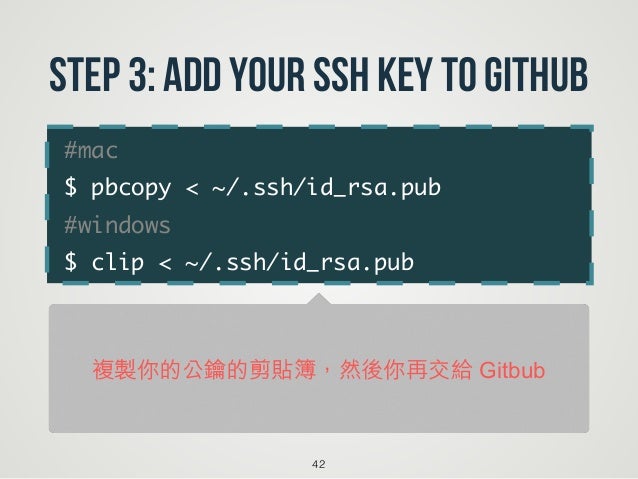Github Generate Ssh Key Mac
Posted : admin On 16.12.2020- Github Generate Ssh Key Mac Free
- Github Get Ssh Key
- Github Generate Ssh Key Mac Keyboard
- Github Create Ssh Key Mac
Github Generate Ssh Key Mac Free
Sep 26, 2019 To generate SSH keys in macOS, follow these steps: Enter the following command in the Terminal window. Ssh-keygen -t rsa. This starts the key generation process. When you execute this command, the. Press the ENTER key to accept the default location. The ssh-keygen utility prompts you for.

Sep 27, 2018 Above will generate two key files, idrsagithub will be private key and idrsagithub.pub will be public key. Once ssh keys are generated as above, head towards configuring keys. If you are running github client on the unix like operating system then you can generate ssh keys inside your home directory. We will generate ssh keys. SiteGround uses key pairs for SSH authentication purposes, as opposed to plain username and password. More information on SSH keys is available here. You can generate an SSH key pair in Mac OS following these steps: Open up the Terminal by going to Applications - Utilities - Terminal. Step ii: Generate SSH Key using PuTTYgen. From the start Menu, search for putty and click 'PuTTYgen'. Click 'Generate'. Move your mouse cursor on the blank area, to generate some randomness. Replace the Key comment, with your GCP username. Copy the entire public key contents as highlighted. You can save your public and private key for future reference. Mar 31, 2020 In this step-by-step Git Tutorial, we will go through how to install Git on a Mac machine, how to generate SSH keys and upload your public SSH key to your GitHub account for authorization. How to Install Git on Mac. Open a terminal and type $ brew install git. This will install Git on your system. To confirm the installation, type $ git -version.
| #! /bin/bash |
| # Use Examples |
| # ./ssh-keygen Additional comments |
| # ./ssh-keygen '(Work)' |
| ROUNDS=100 |
| ifhash networksetup 2>/dev/null;then |
| # Mac only: Computer Name |
| COMMENT='$(networksetup -getcomputername)$@' |
| else |
| COMMENT='$@' |
| fi |
| # remove leading and trailing spaces |
| COMMENT='$(echo '$COMMENT' sed -e 's/^[[:space:]]*//' -e 's/[[:space:]]*$//')' |
| echo'-----> Generating SSH Keys ($COMMENT)' |
| if [ !-f~/.ssh/id_rsa ];then |
| echo -e 'yn'ssh-keygen -q -t rsa -b 4096 -o -a ${ROUNDS} -N '' -C '$COMMENT' -f ~/.ssh/id_rsa |
| ssh-add ~/.ssh/id_rsa |
| echo'~/.ssh/id_rsa' |
| else |
| echo'~/.ssh/id_rsa Skipped!' |
| fi |
| if [ !-f~/.ssh/id_ecdsa ];then |
| echo -e 'yn'ssh-keygen -q -t ecdsa -b 521 -o -a ${ROUNDS} -N '' -C '$COMMENT' -f ~/.ssh/id_ecdsa |
| ssh-add ~/.ssh/id_ecdsa |
| echo'~/.ssh/id_ecdsa' |
| else |
| echo'~/.ssh/id_ecdsa Skipped!' |
| fi |
| if [ !-f~/.ssh/id_ed25519 ];then |
| echo -e 'yn'ssh-keygen -q -t ed25519 -o -a ${ROUNDS} -N '' -C '$COMMENT' -f ~/.ssh/id_ed25519 |
| ssh-add ~/.ssh/id_ed25519 |
| echo'~/.ssh/id_ed25519' |
| else |
| echo'~/.ssh/id_ed25519 Skipped!' |
| fi |
| echo'-----> Generating Secure Enclave Key ($COMMENT)' |
| ifhash sekey 2>/dev/null;then |
| if [ !-f~/.ssh/id_ecdsa256.pub ];then |
| sekey --generate-keypair '$COMMENT' |
| keyline=$(sekey --list-keys grep '$COMMENT') |
| keyarr=($keyline) |
| keyarrlen=${#keyarr[@]} |
| key=${keyarr[((keyarrlen-2))]} |
| echo$key |
| sekey --export-key $key>~/.ssh/id_ecdsa256.pub |
| echo'~/.ssh/id_ecdsa256.pub (Private key is stored in the Secure Enclave)' |
| else |
| echo'~/.ssh/id_ecdsa256 (Secure Enclave) Skipped!' |
| fi |
| else |
| echo'SeKey not installed. (https://github.com/ntrippar/sekey)' |
| echo'1. Ensure you have TouchId built-in to your Mac' |
| echo'2. $ brew cask install sekey' |
| fi |
| echo'Done!' |
Github Get Ssh Key
This version of GitHub Enterprise will be discontinued on This version of GitHub Enterprise was discontinued on 2019-10-16. No patch releases will be made, even for critical security issues. For better performance, improved security, and new features, upgrade to the latest version of GitHub Enterprise.For help with the upgrade, contact GitHub Enterprise support.
Before you generate an SSH key, you can check to see if you have any existing SSH keys.
Note: DSA keys were deprecated in OpenSSH 7.0. If your operating system uses OpenSSH, you'll need to use an alternate type of key when setting up SSH, such as an RSA key. For instance, if your operating system is MacOS Sierra, you can set up SSH using an RSA key.
Open TerminalTerminalGit Bashthe terminal.
Enter
ls -al ~/.sshto see if existing SSH keys are present:Check the directory listing to see if you already have a public SSH key.
By default, the filenames of the public keys are one of the following: Microsoft office pro 2013 key generator.
Github Generate Ssh Key Mac Keyboard
- id_dsa.pub
- id_ecdsa.pub
- id_ed25519.pub
- id_rsa.pub
- If you don't have an existing public and private key pair, or don't wish to use any that are available to connect to GitHub, then generate a new SSH key.
- If you see an existing public and private key pair listed (for example id_rsa.pub and id_rsa) that you would like to use to connect to GitHub, you can add your SSH key to the ssh-agent.
Github Create Ssh Key Mac
Tip: If you receive an error that ~/.ssh doesn't exist, don't worry! We'll create it when we generate a new SSH key.